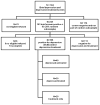Falling through the cracks: gaps in depression treatment among older Mexican-origin and white men
- PMID: 22383214
- PMCID: PMC3560929
- DOI: 10.1002/gps.3779
Falling through the cracks: gaps in depression treatment among older Mexican-origin and white men
Abstract
Objectives: This study aims (i) to compare depression frequency and self-reported depression treatment in Mexican-origin and white men; (ii) to examine ethnic differences in self-reported prior depression diagnosis and types of treatment; and (iii) to determine whether Mexican-origin men (both English and Spanish language preferring) are less likely than white men to report receiving depression treatment after controlling for potential confounders.
Methods: This is a cross-sectional, observational study of Mexican-origin and white men (60 years old and over) presenting for primary care visits at six outpatient clinics in California's Central Valley. Clinical depression was assessed with the Structured Clinical Interview for the Diagnostic and Statistical Manual of Mental Disorders, Fourth Edition (DSM-IV), module for past-year major depression and questions for chronic depression. Past year, self-reported prior depression diagnosis and treatment (i.e., medication, psychotherapy, mental health referral) were assessed through a structured questionnaire.
Results: The frequency of past-year clinical depression was similar for both ethnic groups, yet Mexican-origin men were significantly less likely than whites to report receiving a prior diagnosis of depression or prior depression treatment. Compared with whites, the odds of untreated depression in Mexican-origin men was 4.35 (95% CI 1.35-14.08) for those interviewed in English and 10.40 (95% CI 2.11-51.25) for those interviewed in Spanish. For both ethnic groups, the majority (i.e., approximately two-thirds) of men receiving depression treatment also met criteria for past-year clinical depression.
Conclusions: Mexican-origin older men in primary care suffer from significant gaps in depression care (i.e., diagnosis and treatment) compared with whites. Delivering effective depression treatment (i.e., so that depression remits) remains elusive for both ethnic groups.
Copyright © 2012 John Wiley & Sons, Ltd.
Conflict of interest statement
The authors report no conflicts of interest that could inappropriately influence, or be perceived to influence, this work.
Figures



Similar articles
-
Idioms of Distress Among Depressed White-Non-Mexican and Mexican-Origin Older Men.J Cross Cult Gerontol. 2015 Sep;30(3):305-18. doi: 10.1007/s10823-015-9267-8. J Cross Cult Gerontol. 2015. PMID: 26208782
-
Depression treatment preferences of older white and Mexican origin men.Gen Hosp Psychiatry. 2013 Jan-Feb;35(1):59-65. doi: 10.1016/j.genhosppsych.2012.08.003. Epub 2012 Nov 6. Gen Hosp Psychiatry. 2013. PMID: 23141027 Free PMC article.
-
Depression Attributes Among White Non-Hispanic and Mexican-Origin Older Men.Am J Geriatr Psychiatry. 2015 Sep;23(9):960-9. doi: 10.1016/j.jagp.2014.12.006. Epub 2014 Dec 13. Am J Geriatr Psychiatry. 2015. PMID: 25577303 Free PMC article.
-
Colorectal cancer test use among Californians of Mexican origin: influence of language barriers.Ethn Dis. 2009 Summer;19(3):315-22. Ethn Dis. 2009. PMID: 19769015 Free PMC article.
-
Comparing Preferences for Depression and Diabetes Treatment among Adults of Different Racial and Ethnic Groups Who Reported Discrimination in Health Care [Internet].Washington (DC): Patient-Centered Outcomes Research Institute (PCORI); 2021 Jan. Washington (DC): Patient-Centered Outcomes Research Institute (PCORI); 2021 Jan. PMID: 38478703 Free Books & Documents. Review.
Cited by
-
Illness conceptualizations among older rural Mexican-Americans with anxiety and depression.J Cross Cult Gerontol. 2013 Dec;28(4):421-33. doi: 10.1007/s10823-013-9211-8. J Cross Cult Gerontol. 2013. PMID: 24077906 Free PMC article.
-
Examining Associations between Community Health Worker-Rated Health and Mental Health among Latino Adults with Chronic Disease.Int J Environ Res Public Health. 2020 Dec 25;18(1):100. doi: 10.3390/ijerph18010100. Int J Environ Res Public Health. 2020. PMID: 33375663 Free PMC article.
-
Unmet Mental Health Need Among Chinese and Latino Primary Care Patients: Intersection of Ethnicity, Gender, and English Proficiency.J Gen Intern Med. 2020 Apr;35(4):1245-1251. doi: 10.1007/s11606-019-05483-9. Epub 2019 Oct 30. J Gen Intern Med. 2020. PMID: 31667737 Free PMC article.
-
Idioms of Distress Among Depressed White-Non-Mexican and Mexican-Origin Older Men.J Cross Cult Gerontol. 2015 Sep;30(3):305-18. doi: 10.1007/s10823-015-9267-8. J Cross Cult Gerontol. 2015. PMID: 26208782
-
Costs of implementing and sustaining enhanced collaborative care programs involving community partners.Implement Sci. 2019 Apr 18;14(1):37. doi: 10.1186/s13012-019-0882-6. Implement Sci. 2019. PMID: 30999936 Free PMC article.
References
-
- Addis ME, Mahalik JR. Men, masculinity, and the contexts of help seeking. American Psychologist. 2003;58:5–14. - PubMed
-
- Angel JL, Hogan DP. Population aging and diversity in a new era. In: WHITFIELD KE, editor. Closing the Gap: Improving the Health of Minority Elders in the New Millennium. Washington DC: Gerontological Society of America; 2004.
-
- Arean PA, Ayalon L, Hunkeler E, et al. Assessment and treatment of depressed older adults in primary care. Medical Care. 2005;12:321–335.
Publication types
MeSH terms
Grants and funding
LinkOut - more resources
Full Text Sources
Medical
Miscellaneous

